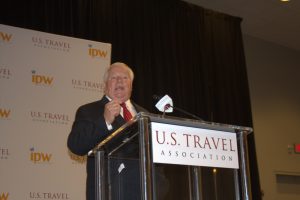

The American Society of Travel Advisors (ASTA) has strongly condemned the January 6 occupation of the US Capitol in Washington, DC by pro-Trump protesters. In a statement issued by president and CEO Zane Kerby, he said, “We watched yesterday’s events at the U.S. Capitol with a mixture of shock, sadness and disappointment. This was an assault not just on a building that is the acknowledged worldwide symbol of democracy and freedom, but also an act of violence and intimidation at a place where many of our friends and neighbors work. Four people lost their lives in yesterday’s mayhem, with many more injured. Physical intimidation can never be how we resolve disagreements in this country, however inflamed political passions may grow. We commend law enforcement for minimizing harm to people and property and quickly bringing the situation under control, and lawmakers for promptly resuming the work they are sworn to do.”
The statement continued,“Today, our country as a whole and the travel industry in particular are facing challenges with few parallels in history all while under the clouds of this horrific pandemic that has yet to abate. We need to come together as a people, through our elected officials in Washington, and do what needs to be done to get through this crisis and start building a better future.”
U.S. Travel Association president and CEO Roger Dow echoed the sentiments of the ASTA, adding: “We are profoundly heartbroken by the disturbing actions at the U.S. Capitol that are being viewed around the world. The behavior we are witnessing has no place in any peaceful democracy, much less in the country that is supposed to be the foremost example of democratic principles.
“Working American families depend on a productive government to facilitate their livelihoods—especially in this time of unprecedented crisis and challenge—and the willful disruption of our democratic transition is an unacceptable act of harm that is felt not just in Washington, but in every corner of the country.
“With all our hearts, we urge the swift and peaceful end to the chaos and mayhem in our capital city, and that we come together to heal and move forward for the sake of our country and our future.”
Several other travel CEOs have joined the chorus of condemnation. Delta Airlines CEO Ed Bastian told staff that “peaceful protest has been a powerful force for change throughout U.S. history. But it must never cross the line into violence and insurrection.”
American Airlines issued a strongly worded statement signed by its CEO Doug Parker and president Robert Isom, in which they declared that “we cannot look at yesterday without acknowledging for our Black colleagues, the unrest and treatment of the rioters was especially painful to watch. This is another example of the progress that still needs to be made in the pursuit of equality and justice for all Americans. We recognize the disparity in how other protestors have been treated, and our commitment to making meaningful change within our company and our communities is reinforced and strengthened.”
United Airlines CEO Scott Kirby condemned the “display of vandalism and violence,” while Marriott CEO Arne Sorensen spoke of respecting the fact that while “we have associates who have very different views on the results of this election and the direction of the United States…” but “what we can’t do is trample the Constitution; we can’t use violence and terror to force an agenda. It’s not who we are – and I would offer, it’s not what the vast majority of Americans want.”
There is little doubt that the events of January 6 do little to help promote US tourism, which has been decimated by the Covid-19 pandemic. According to a report by the World Travel & Tourism Council (WTTC), the US economy lost $155 billion due to the collapse of internati0nal tourism – the equivalent of $425 million a day, or almost $3 billion a week. International travel spending in the US in 2019 was $195.1 billion, which was 16 per cent of the country’s total tourism-sector spending – break it down and it’s nearly $16.3 billion a month, which equates to $3.7 billion a week or $534.5 million a day. Therefore the pandemic resulted in an astonishing 79 per cent loss of revenue.




